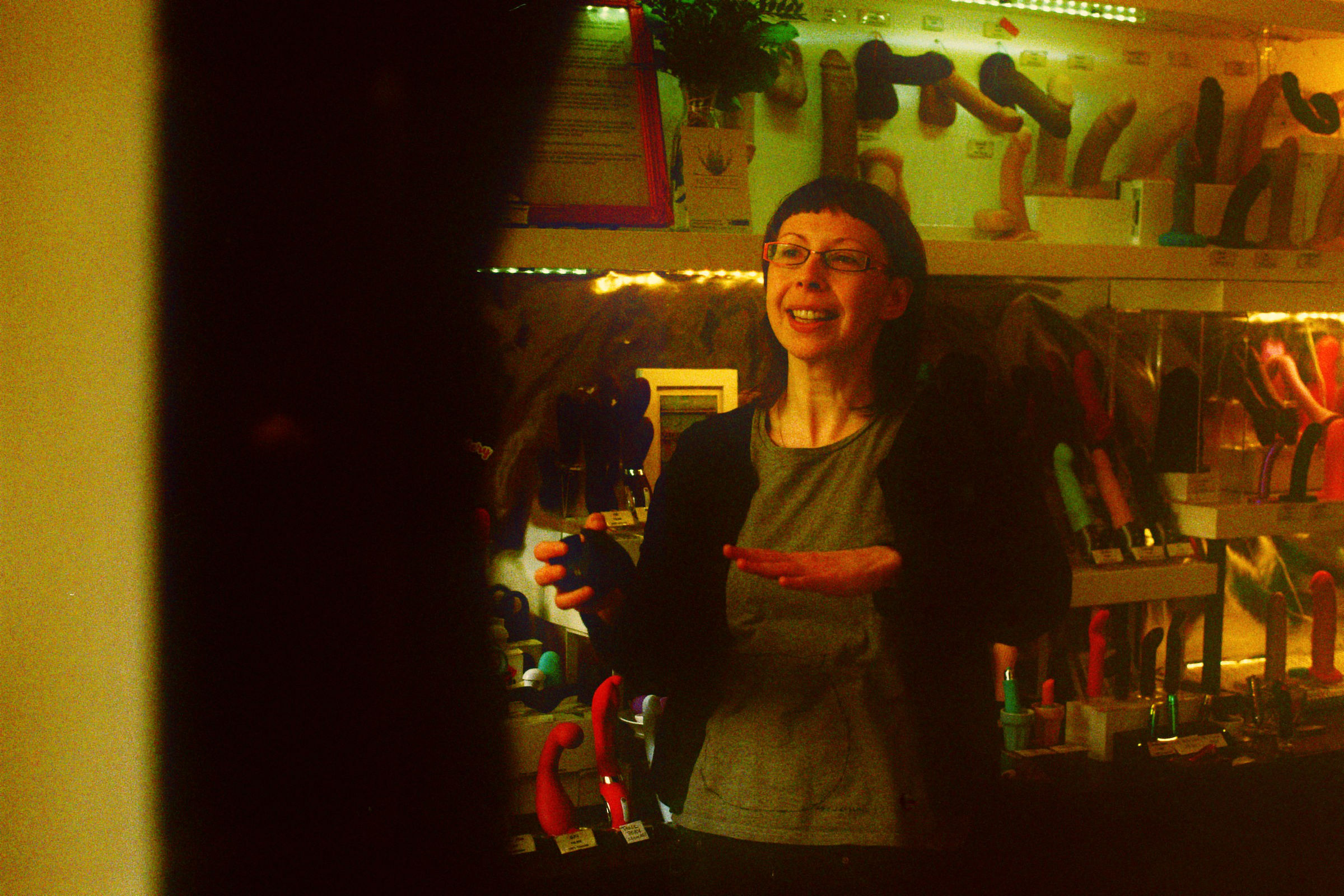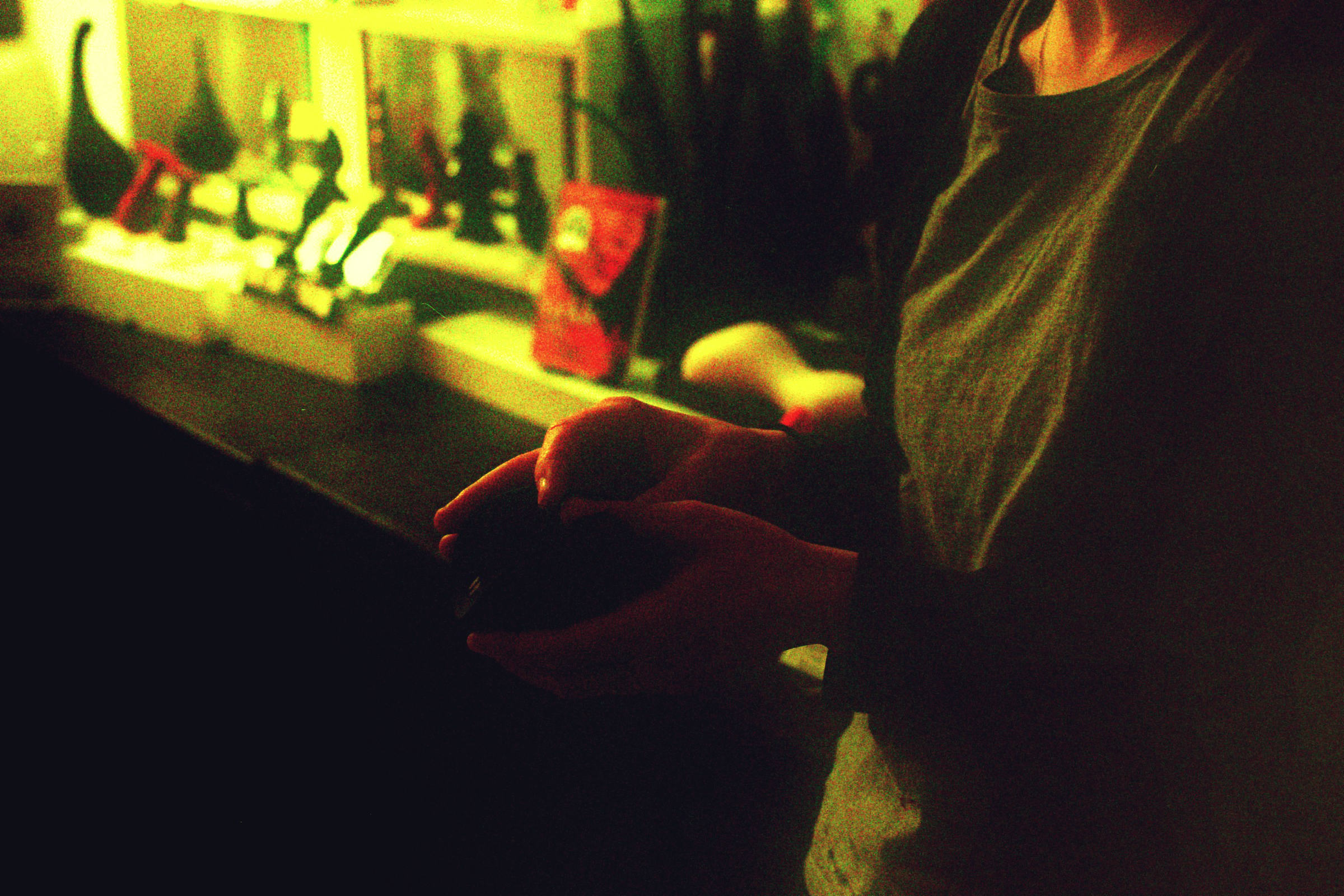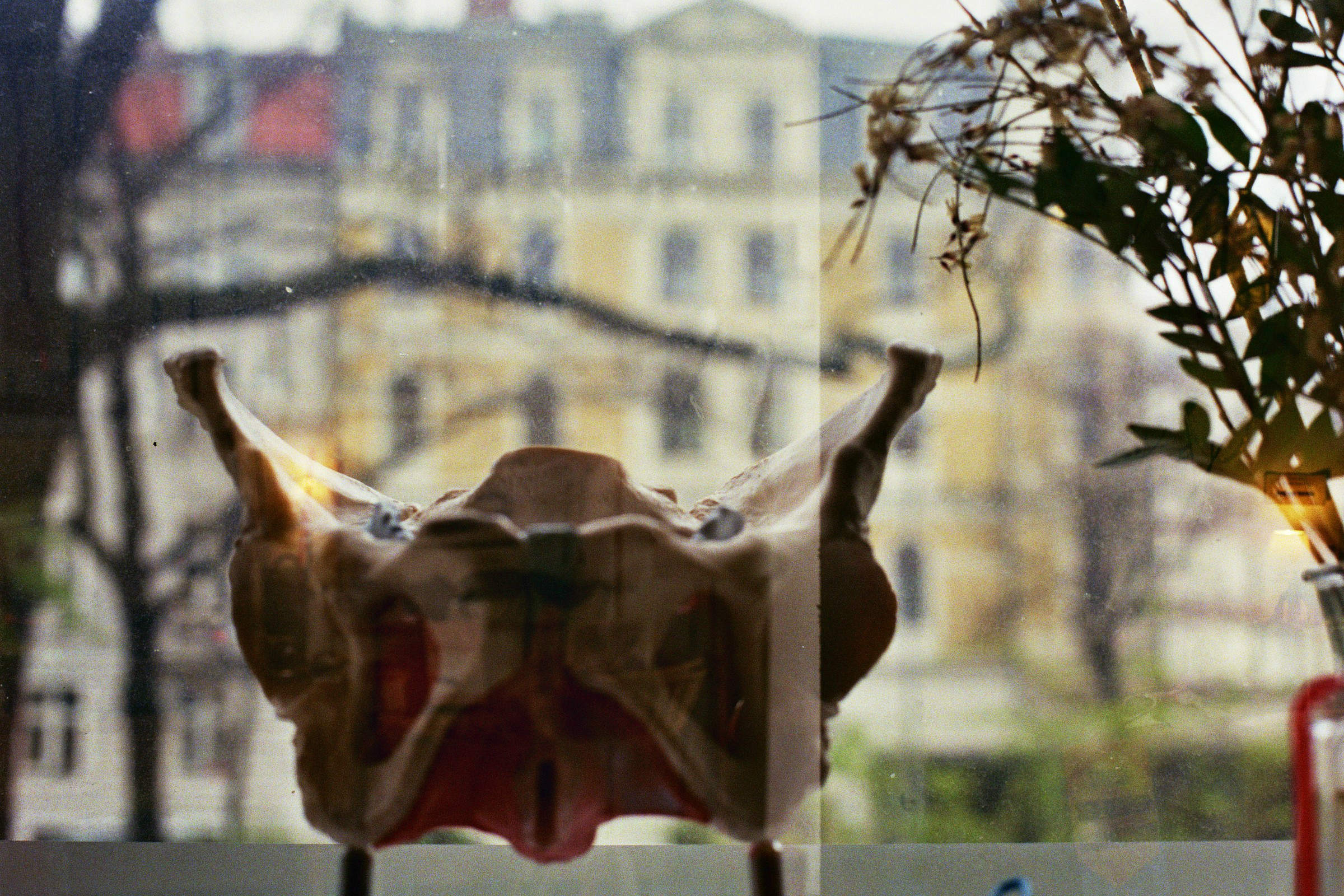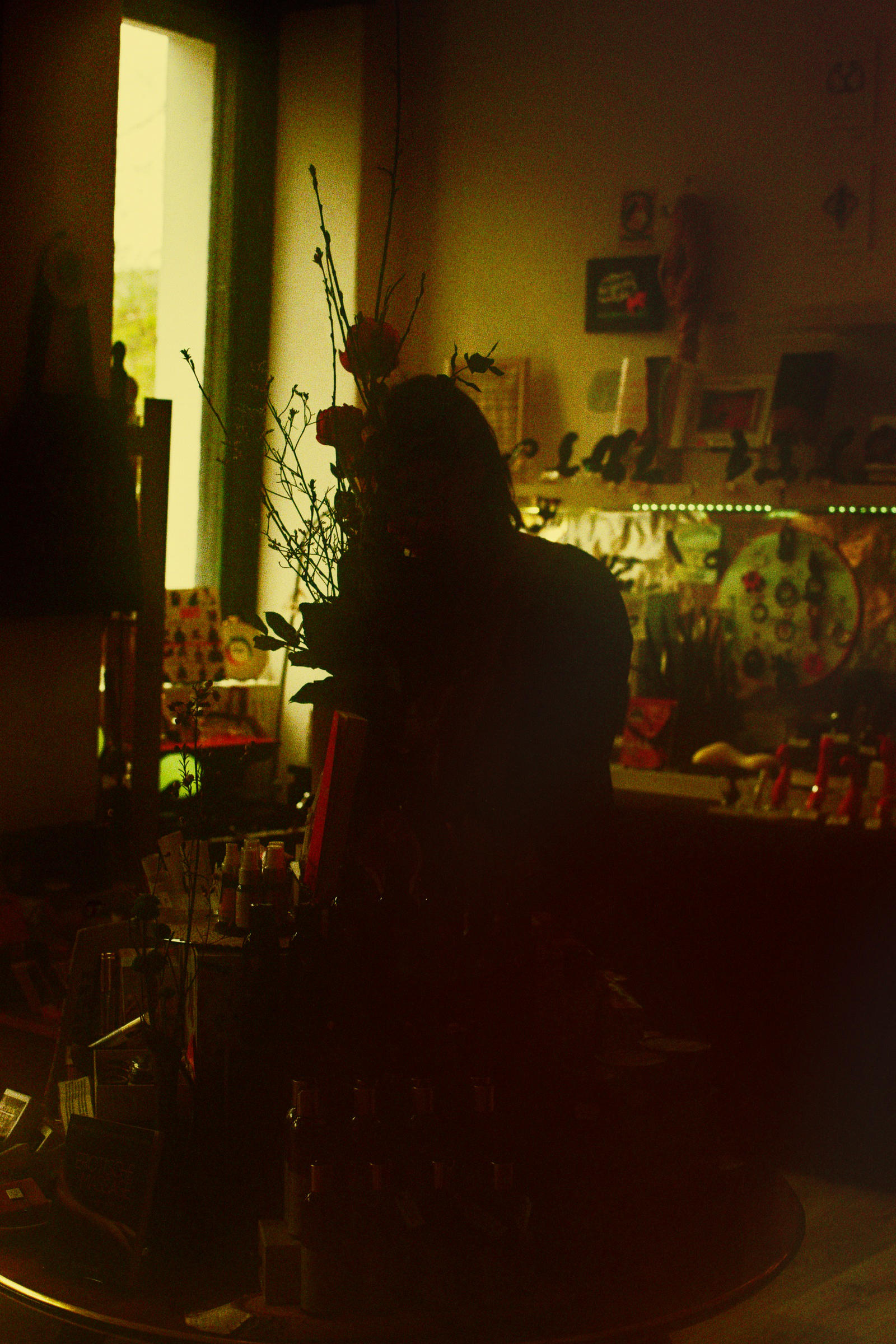Sara
—
Let’s talk about sex.
Since Other Nature’s founding back in 2011, Sara Rodenhizer’s brainchild has taken Berlin by storm. The feminist, queer, sex-positive, eco-friendly and vegan sex shop is creating noise in an industry which is still very much thwarted by heteronormativity, patriarchy and misogyny alongside environmentally destructive products and practices. Whether she is examining the bigger picture or delving into her daily work, at the crux of it all, Sara strives to combat socially constructed ideals of normality. As the Other Nature website aptly states: “There are over 7 billion different kinds of normal on this planet… and they’re all welcome here!”

Despite Other Nature’s success, Sara herself is not one to seek out the limelight. She much prefers keeping herself busy behind the counter, restocking shelves, answering walk-in customers’ questions and driving forward the business with her team. Nevertheless, she invited us over for a cup of tea in the book room, where she happily opened up about her path, vision and ideals. Take a peek inside Sara’s world to learn more about her enthusiasm for selling sex toys, the problems she sees in most forms of sex education as they stand today, and her mission to foster more butt positivity.


Where did your interest in the sex toy industry and sex education come from? What is it about your work that you are so deeply passionate about?
My passion for this work definitely began—and just kept on growing—from working at Venus Envy, an awesome feminist sex shop in Ottawa, Canada, where I worked for many years. When I started at Venus Envy, I was doing my undergrad in English Literature, and I was way more interested in reading all the sex books than I was the books from the so-called literary “canon” (works almost entirely written by white cis-gender English men). Tough choice, right?
In terms of what it is that I’m so passionate about, I think it ultimately comes down to my belief that having access to good, comprehensive and compassionate sex ed can actually change the world for the better. Although the state of things right now can feel pretty overwhelming and discouraging—knowing how far society still needs to go, for example, to improve sex education in schools or eradicate gender-based violence and discrimination—it's this big picture stuff that drives me and offers the biggest, most challenging goals.
Given the spectrum of important topics that sex ed encompasses—consent, gender, pleasure, anatomy, body image, STIs, communication, relationships, porn, power, privilege, harassment, abuse etc.—it seems to me like a no-brainer that sex ed shouldn’t be some after-thought (if even a thought at all), or niche business, but rather a central part in the re-imagining of our societies. And though our reach as a small shop is relatively limited, we’re nonetheless actively engaging in this re-imagining, and seeing first-hand the positive impact that talking openly and honestly about sexuality can have. It’s pretty awesome.


You're a Canadian citizen operating your own business in Germany. What challenges have you faced here?
The biggest challenge for me has been German. When I started Other Nature, I hardly spoke any German, and over the years, my German has gotten much better, but it’s still not great. Talking with customers is one thing, and the language differences can actually be a nice meeting ground sometimes…We’re in a sex shop, but we’re speaking about language and geography and culture, and not about sex per se, so there’s time to relax and settle in before talking about actual sex stuff. For some people, it’s easier to talk about more intimate subjects in a second language. Where my lacking German skills really bring me down is when I have to do administration, which is pretty much all the time.
Earlier, you spoke about empathy and how your own experiences have helped shape the way you engage with the people who visit Other Nature. Can you elaborate on this?
I’m an incredibly shy person, which often surprises people, probably because I’m also quite smiley and excitable…Maybe also because I spend my days talking to strangers about sex. But these things are all true. And, though my shyness is sometimes an obstacle that prevents me from doing certain things, like giving workshops, it’s also a gift in some ways, because it allows me to empathise with customers who feel nervous coming into a sex shop or asking their sex questions.
For example, I immediately relate to people who b-line to the book room, even when they really want to ask about butt stuff. I myself was the person who managed to ask about menstrual products on my first or second visit to the sex shop, but waited until my third or fourth before even approaching the dildo wall. So now, all these years later, and with the help of the incredible sex educators, I’ve had the privilege of knowing and working with, I think that part of the reason why I'm able to create an environment where people feel OK talking about sex is because I know the amazing relief and freedom that comes with letting go of—or even just confronting—my own weirdness and shame and feelings of being judged. And I want to help others have that experience too.


How do you demystify sexual education and make it more available/seem more ‘natural’ to people?
We still have a long way to go when it comes to bringing good sex education to the mainstream, and need to get even more creative in finding ways to show–and sometimes even convince–people why services and spaces like Other Nature are necessary for a functioning society.
As a feminist business, we often struggle with the capitalistic context in which we operate: that in order for us to stay open and do important educational work, we also need to sell stuff. It helps that we sell things that we truly stand behind and that give people pleasure, but the fact that the bottom line is even a factor can be disheartening. But as Lynn Comella pointed out in Vibrator Nation, her awesome book about the rise of the feminist sex shop in the US, connecting sex education with shopping has its advantages when it comes to making sex ed accessible. Most people are familiar with the shopping experience and know broadly what to expect. Whereas lots of people will never avail themselves of a sex therapist or other counselling services, maybe because it puts them in quite a vulnerable position in some ways, or those services aren’t financially accessible. However, going into a shop is within most people’s comfort zone. So doing sex ed as a business is definitely one way of making it more available to people.
One of the biggest disappointments that comes with doing sex ed as a sex shop is that our services and expertise are largely off-limits to people under the age of 18, because in Germany you have to be 18 to enter a sex shop. I personally think this is ridiculous, when so many young people are having sex before they’re 18. As a society, we’re failing young people in a very big way—probably because adults are so messed up by their own lack of good sex ed! It’s a vicious cycle.
Meanwhile, one of the main issues on people’s radar these days, including in the media, is that children and youth can access free porn online from almost anywhere, and how this is negatively impacting their sexual development. But there’s surprisingly little conversation going on about how this free online porn is their sex education, and that we could actually help the situation dramatically by offering young people a much fuller, more appropriate, and less anxiety inducing education about sex related stuff. No matter what we do, kids are going to watch internet porn, so let’s give them some tools to be able to put what they’re watching in perspective. Also, they need to be given a space where they can talk about what they saw and how it made them feel. Teenagers are having sex—all kinds of sex—but can’t even walk into a sex store and buy lube. Obviously, there’s a strong need for more access to education on all levels.



In the English language, words such as cunt, pussy, asshole and dick are often used as derogatory terms. How do you think language affects the way we perceive and experience sex?
Language is such a complicated thing, and it changes over time. It has such power, and yet it’s something that we all wield, often quite carelessly. Even sex-positive people aren’t immune to using these words, though we should probably know better. I try to be careful—but I admit, I do say asshole a lot. But, on the other hand, everyone has an asshole…maybe that makes it less bad?
I guess you have to differentiate between intention and impact; and even if our intention isn’t bad, using these terms can affect how we feel and think about bodies, sometimes in subtle ways that are difficult to unpack. So if we take the asshole, for example, sex-negative butt-language, whether it’s intended or not, can reinforce negative messaging and associations we have about the butt: that it’s a dirty place where poo comes out, rather than a place of joy and pleasure. And that kind of negative reputation isn’t fair to our butts. Sadly, the butt is missing in sexual education altogether. If we talk about it at all, it’s usually medicalized and linked with problems like gastrointestinal issues. And while that stuff is important, and also plays a part in anal sex ed, I want to encourage folks to associate assholes with nice things, too. If you really want to transform the way you think about your butt hole, a jewel butt plug is one strategy—they’re so pretty! But there are many ways to foster butt positivity. That’s a lot of what we do at Other Nature.
What book is on your nightstand at the moment?
The Erotic Mind by Jack Morin—the author of Anal Pleasure & Health.